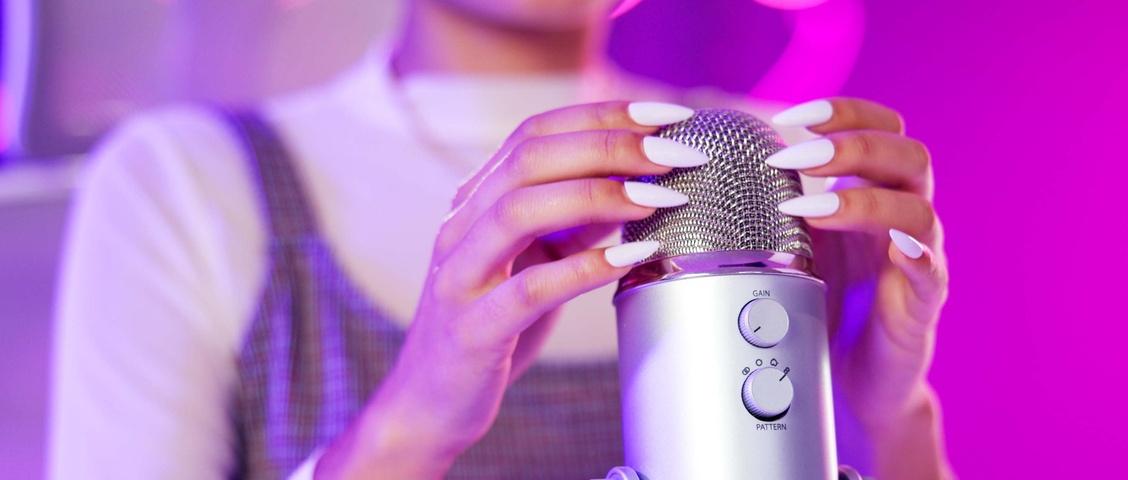
Is ASMR the secret to sensory bliss?
Peer reviewed by Dr Krishna Vakharia, MRCGPAuthored by Victoria RawOriginally published 28 Oct 2024
Meets Patient’s editorial guidelines
- DownloadDownload
- Share
- Language
- Discussion
ASMR content has a fanbase of billions. Featured on platforms such as YouTube and TikTok, it offers a calming blend of sight, sound and touch. Many people use it as a natural way to unwind and de-stress. If you're not already familiar ASMR - and even if you are - read on to learn more about this creative form of therapy and if it has any benefits.
In this article:
Continue reading below
What is ASMR?
Autonomous Sensory Meridian Response (ASMR) is a sensory experience that since 2007 has become a worldwide phenomenon.
Many people describe it as a tingling sensation triggered by sensory stimuli, leading to feelings of emotional wellbeing, such as relaxation, contentment, tranquillity, and even exhilaration.
Some of the most popular ASMR videos by successful ASMR creators - otherwise known as ASMRtists - involve close-up actions such as rustling paper, playing with slime or putty, crushing soap, hair brushing, lighting candles, whispering and eating.
What does ASMR mean?
Back to contentsASMR is a spontaneous and enjoyable sensation, prompted by exposure to specific sounds, sights, touches or personal interactions.
Dr Sham Singh, Psychiatrist, WINIT Clinic, Santa Monica, USA explains: "ASMR is usually activated by sound or videos - such as whispering, tapping, or slow, purposeful movements. Because of its soothing nature, people look for ASMR content to relax and reduce stress."
There are many videos, social media channels and podcasts out there offering a wealth of online ASMR experiences.
ASMR content can include the following types of mental and visual stimuli that often overlap:
Sounds - Whispering, gentle breathing, soft sounds, crinkling, tapping, eating, nature, storytelling.
Videos - Close-ups, self-care routines, textures, slow hand movements, personal attention, painting, role-playing, object manipulation.
Continue reading below
What does ASMR do to your brain?
Back to contentsSome people don't respond to ASMR stimuli. However, in those who do, studies show that it can trigger certain types of brain activity connected to:
Feelings.
Emotions.
Physical sensations.
Movement.
Social interactions.
Sandra Kushnir, Founder of Meridian Counseling, California, USA explains that ASMR activates the regions of your brain associated with pleasure response and relaxation.
"This activation can lead to a state of calm and pleasure - similar to the feeling of being comforted or cared for," she says. "The brain's response to ASMR can be compared to the sensations experienced during meditation or mindfulness practices - which also promote relaxation and wellbeing."
What does ASMR feel like?
Back to contentsMost people feel a tingling sensation that begins at your scalp or neck and travels down your spine to other areas of the body.
Singh says that some describe this feeling as relaxing and gently arousing - like the feeling of a light head massage, or the chills you might get from listening to a powerful piece of music.
Continue reading below
What are the wellness benefits of ASMR?
Back to contentsResearch suggests that ASMR could help wellbeing in several ways. These include lifting your mood and improving focus and relaxation.
"ASMR has been known to reduce pain, improve one's sleeping and mood patterns, help you relax, improve focus, and reduce stress," says Singh. "Its calming nature can help decrease cortisol, and increase the release of endorphins produced by your body to kill pain. Many also report a more focused, present state of being after an ASMR session, which becomes useful in handling everyday stressors."
Can ASMR boost your mood?
Studies show that watching ASMR videos can positively affect your mood.
In a study of 475 participants, 8 out of 10 people reported improved mood after experiencing ASMR stimuli - one half of whom felt these effects even without the typical tingling sensation.
Kushnir describes: "Many people report feeling happier and more relaxed after watching or listening to ASMR. It can also provide a sense of contentment."
Does ASMR help with sleep?
Research suggests that ASMR stimuli may help some people unwind and fall asleep more easily.
"These effects can be good for people who struggle with insomnia or restless nights," explains Kushnir. "ASMR can help calm your mind and body, making it easier to fall and stay asleep."
Singh adds that ASMR videos are becoming a popular part of people's night-time routine, to help their minds and bodies wind down before bed.
Can it reduce pain?
More studies are needed to confirm whether ASMR can help with pain management. However, Kushnir explains that whilst not treating the cause, some people find ASMR eases the effects of pain by providing a distraction to take their mind off it and helping relaxation.
This is especially relevant to headaches, Singh says: "Relaxation and a decline in stress levels can reduce physical tension - one of the main causes of headaches."
Does it help you concentrate?
More research is needed to confirm the effects of ASMR on whether it can improve your concentration. However, Kushnir explains that some people feel it improves their ability to concentrate - which is useful for studying or working. The relaxing effects can help clear their mind and reduce mental clutter, allowing for better attention to tasks.
Can ASMR help manage ADHD or autism?
More studies are needed to understand whether ASMR can help manage symptoms of Attention Deficit Hyperactivity Disorder (ADHD). There is also no scientific evidence linking ASMR as a treatment for autism.
However, Singh explains that there is some anecdotal evidence that the relaxing and focussing effect of ASMR could potentially reduce the degree of hyperactivity associated with ADHD symptoms, and enhance attention spans.
He adds that ASMR may create a unique sensory experience that could reduce stress and help some people living with autism relax.
"The ability to control and predict ASMR stimuli has calming effects and can be quite useful in controlling overload and anxiety," he says. "Some people with autism use ASMR to self-regulate and manage sensory processing difficulties."
Are there any negative effects of ASMR?
Back to contentsAccording to Kushnir, ASMR is generally considered safe, though some people could find certain audio or visual triggers unpleasant, or have overstimulation.
Singh advises that everyone should know their limits, and when to stop if negative sensations or higher levels of anxiety occur.
"The main factors contributing to the positive experience of ASMR are moderation and personal preference," he says.
Does ASMR work for everyone?
Not everyone experiences the calming effects of ASMR, despite its therapeutic potential for others.
"While some find ASMR a quick, easy way to relax or reduce stress," says Singh. "Others simply do not feel the tingling, or do not like the stimuli."
Kushnir explains that sensitivity to ASMR triggers can differ from person to person. It's important to recognise that everyone's sensory experiences are unique - what works for one person may not work for another.
"ASMR can be a valuable tool for promoting relaxation, reducing stress, and improving overall well-being," she concludes. "By exploring different triggers and incorporating ASMR into your self-care routine, you may find it a helpful addition to traditional mental health practices."
Many people consider ASMR useful for managing depression, anxiety, insomnia, and stress. While research into its mental health benefits is ongoing, it's essential to remember that ASMR is not a replacement for professional medical care. If you're living with any of these conditions, see your doctor to discuss the issue and the best treatment.
Patient picks for Mental health therapy

Treatment and medication
What is dialectical behavioural therapy (DBT)?
Adults with diagnoses characterised by emotional dysregulation (such as borderline personality disorder) run a much higher risk of self-harm and death from suicide. For people with these diagnoses, evidence-based therapies like DBT can be life-saving.
by Ellie Broughton

Treatment and medication
How to decide between different types of therapy
Therapy is in demand more than ever before in the UK, with an increasing number of people seeking professional mental health support. However, it can be difficult to distinguish between the different types of therapy available - especially privately - and to know what kind of therapist or counsellor you need.
by Lydia Smith
Article history
The information on this page is peer reviewed by qualified clinicians.
Next review due: 28 Oct 2027
28 Oct 2024 | Originally published
Authored by:
Victoria RawPeer reviewed by
Dr Krishna Vakharia, MRCGP

Ask, share, connect.
Browse discussions, ask questions, and share experiences across hundreds of health topics.

Feeling unwell?
Assess your symptoms online for free
Sign up to the Patient newsletter
Your weekly dose of clear, trustworthy health advice - written to help you feel informed, confident and in control.
By subscribing you accept our Privacy Policy. You can unsubscribe at any time. We never sell your data.